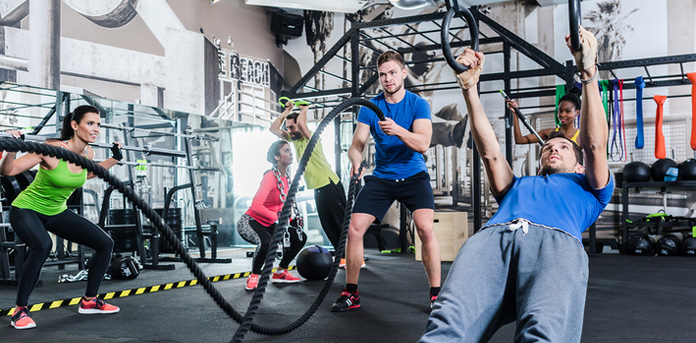Functional fitness is an integral part of our physical well-being that influences people of all ages. It focuses on improving everyday movements and overall health. Whether you’re a fitness freak or just starting, understanding the importance of functional fitness can help you live a healthier and more active life.
In today’s world, our time and energy are in high demand, making functional fitness more important than ever. No matter your age, fitness level, or lifestyle, incorporating functional fitness into your routine can offer a variety of benefits. These benefits include reducing the risk of injuries, improving sports performance, and promoting long-term well-being.
Benefits Of Functional Fitness

Incorporating functional fitness into your regular workout regimen offers a multitude of benefits that extend beyond traditional exercise routines. This type of fitness focuses on improving the body’s ability to perform practical movements and activities used in daily life, resulting in several advantages. Here are some of the key benefits of functional fitness:
Improved Everyday Movements
Functional fitness exercises mimic real-life activities like lifting, bending, twisting, and reaching. By training the body to perform these movements more efficiently, you’ll experience improved ease and fluidity in your day-to-day tasks. Daily activities like carrying groceries, playing with children, or even sitting down and standing up become easier and less taxing.
Reduced Risk Of Injuries
Functional fitness emphasizes strengthening the core, improving balance, and enhancing joint stability. By working on these aspects, you can better protect yourself from common injuries caused by slips, trips, and falls. Additionally, functional exercises promote proper body mechanics, reducing the likelihood of muscle strains or overloading during physical activities.
Improved Balance And Stability
As we age, maintaining balance becomes increasingly important to prevent falls and maintain independence. Engaging in functional fitness exercises can help improve your balance and coordination by engaging the stabilizing muscles. This enhanced stability not only reduces the risk of falls but also allows you to perform more advanced exercises and movements with confidence.
Boosted Overall Health And Well-Being
Functional fitness workouts typically engage multiple muscle groups simultaneously, leading to increased cardiovascular endurance, strength, and flexibility. Regular engagement in functional fitness can contribute to weight management, improved heart health, and a reduced risk of chronic conditions like heart disease, diabetes, and hypertension. This can ultimately lead to a boost in overall health and well-being.
Increased Sports Performance
For athletes and sports enthusiasts, functional fitness can significantly enhance performance on the field or court. By replicating specific movements relevant to your chosen sport, you can improve agility, power, and speed, translating into a competitive edge and reducing the risk of sports-related injuries.
Efficient Workouts
Functional fitness often utilizes minimal or no equipment, making it an accessible and time-efficient workout option. These exercises can be easily incorporated into busy schedules, allowing you to get a full-body workout in a shorter amount of time.
Adaptable For All Fitness Levels
One of the greatest advantages of functional fitness is its adaptability. Whether you’re a beginner or an advanced athlete, exercises can be modified to suit your fitness level and gradually progressed as you improve. This inclusivity makes functional fitness accessible to virtually everyone.
Functional Exercises For Children and Teens
Are you looking for ways to help your children or teenagers develop their physical abilities? Functional fitness exercises aren’t just for adults, they can also be incredibly beneficial for young individuals. These age-appropriate exercises can help develop fundamental movement patterns, coordination, and strength – essential components of overall physical development.
Activities like bodyweight exercises, crawling, jumping, and balance drills can improve motor skills, build bone density, and even lay the foundation for a lifelong commitment to fitness. Encouraging children and teens to participate in functional fitness can also instill healthy habits, boost self-esteem, and promote a positive body image.
Functional Fitness For Young Adults And Professionals
As young adults transition into the professional world, maintaining a healthy lifestyle becomes crucial for managing the demands of work, social life, and personal responsibilities. Functional fitness offers a practical approach to staying active amidst busy schedules.
Functional exercises can be easily integrated into short workout sessions or incorporated into daily activities, such as using stairs instead of elevators or biking to work. By focusing on functional movements that improve posture, core strength, and flexibility, young adults can prevent sedentary-related health issues and maintain their physical well-being.
Functional Training For Seniors And Aging Adults
Maintaining physical well-being is essential for seniors and aging adults. Functional training is particularly important for them as it can improve their independence and overall quality of life. As we age, it becomes increasingly crucial to maintain strength, balance, and flexibility to prevent falls and injuries.
Functional exercises that focus on stability and mobility can enhance daily activities such as walking, standing up from a chair, and reaching for objects. Moreover, functional fitness can help manage age-related conditions like arthritis and osteoporosis. Customized programs that consider individual fitness levels and medical conditions enable seniors to lead more active and healthy lives.
Expert Opinions On Functional Training
Here are some expert opinions regarding functional training:
- According to Dr. Stuart McGill (Spine Biomechanics Researcher), Functional training, when done in a proper form, can help individuals build a solid foundation of core stability and muscular control, reducing the risk of back injuries and improving overall functional capacity.
- Mark Verstegen who is a Performance Coach and Founder of EXOS says, Functional training is a major component of our athlete development programs. By focusing on movements that mirror real-life and sports-specific actions, athletes can achieve optimal performance and minimize the risk of injuries.
- Gray Cook renowned Physical Therapist and Co-founder of Functional Movement Systems is of the opinion that Functional training is all about identifying and addressing movement dysfunctions and imbalances to improve overall functional capacity. By prioritizing movement quality, we can enhance performance and longevity.
Studies Related To Functional Training
This study compared the strength outcomes of individuals using traditional fixed resistance machines versus free-form functional training equipment. The results highlighted the effectiveness of functional training in improving strength and functional capacity.
This meta-analysis examined the impact of resistance training, including functional exercises, on muscular strength in female youth. It found positive effects on strength development, supporting the inclusion of functional training in youth fitness programs.
This study investigated the acute effects of physioball exercises (a form of functional training) compared to conventional floor exercises on balance and stability. The findings indicated that functional exercises on a physioball could positively impact balance and stability.
FAQs
What is functional training?
Functional training is a type of exercise that focuses on movements and exercises that simulate real-life activities and improve overall functional capacity. It emphasizes training multiple muscle groups together to enhance coordination, strength, balance, and flexibility.
Who can benefit from functional training?
Functional training is beneficial for individuals of all fitness levels and ages. It is particularly valuable for athletes looking to improve sports performance, individuals seeking injury prevention and rehabilitation, and anyone wanting to enhance everyday movements and overall fitness.
Are there specific equipment requirements for functional training?
Functional training can be performed with minimal or no equipment, making it accessible to many. Common equipment used includes resistance bands, medicine balls, kettlebells, stability balls, and bodyweight exercises. However, the use of equipment can vary based on individual goals and preferences.

